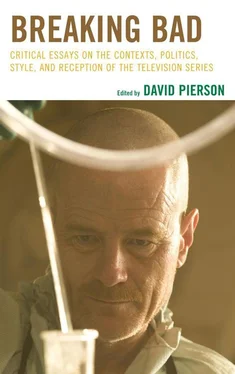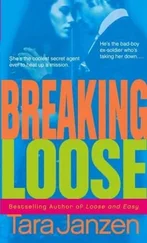In a sense, Walt becomes a prisoner, forced to acknowledge the time spent up to and including his current state and the time he has remaining. As a high school chemistry teacher and a part-time cashier at a car wash, Walt is far from affluent. Therefore, in an inverse of “time equals money,” Walt procuring additional income equals “time.” In one sense, the money he needs to earn will provide his family with a future. At the same time, the money that Walt craves also extends his time, despite his death. What I mean to suggest is that the money becomes his legacy, and, after his passing, the financial security he provides for his family signifies an extension of his life in the form of capital. This cynical commentary imagines the human body as a machine to produce inheritance (and relegates the body’s worth to market value), but I believe this is an appropriate correlation in that the money that Walt wants to provide his family is akin to the “growth, decay, and transformation” of all living things that he lectures about to his students in the pilot episode. Walt has grown from child to adolescent to adult; at the age of fifty and upon his diagnosis, one could say that he has begun to decay; and, the money that he hopes will signify his existence is his transformation.
As Walt looks toward the future and the success that money will symbolize, he is also forced to look at the insisting, consisting past that brought about his present, which shifts Walt’s focus from time remaining to time lost . In the pilot episode, it is clear that Walt’s intellectual acumen surpasses his financial success. Interestingly, his intelligence is often perceived as a social detriment. His brother-in-law Hank remarks about the gigantic size of Walter’s brain suggesting that his intellect has categorized him as a societal runt. Walt first laments his time lost in “…And the Bag’s in the River” (2/10/08) as he and Jesse are sponging the dissolved remains of Emilio from the second floor of Jesse’s home. At this time, Walt flashes back to a conversation he had about the elements in the human body. While mordantly comical, this scene introduces Gretchen, his previous love interest. The connection here is not solely to show that someone existed prior to Skyler, but to illustrate the heights from which Walt has fallen. While not fully exposited, it seems his departure from his field coincided with Gretchen falling in love with Elliot, Walt’s partner. In a later episode, when Walt is surrounded by successful scientists who work for Gray Matter Technologies, the company owned by Gretchen and Elliot that Walt helped build, [3] This occurs in the episode “Gray Matter” (2/24/08).
he graciously notes that he drifted into teaching, but this is ominously prefaced in an earlier episode when he ponders the paths one takes in life. [4] Walt’s comment occurs in the episode “… And the Bag’s in the River” (2/8/08).
Within this lament, Walt becomes a character who lives his remaining life in a vacuum of regret.
For Walt, Gretchen and Elliot represent the success and wealth that he could have achieved. From his perspective, they both removed him from their equation in order to build their own empire from his work. [5] This comment occurs in the episode “Peekaboo” (4/12/09).
Whether or not this is true is up for discussion, but Walt sees himself as an overqualified high school chemistry teacher and a man who has watched others pass him by in life. [6] This observation is made in the episode “Bit by a Dead Bee” (3/22/09).
Therefore, the money reaped through meth manufacturing provides Walt with the financial status that he feels was swindled from him. It also puts him once again at the forefront of a field. While taboo, the blue stuff that Walt produces becomes the purest methamphetamine that the market has seen. Walt’s intellect is highlighted, but its emphasis is bred from nefariousness. This is another interesting commentary on capitalist society in that Walt’s intelligence—on a legitimate level—has become undervalued in an economic hierarchy that requires “management and technical positions that can be open to everyone because they do not require genuine expertise” (Widder 2008, 153). Walt, a former contributor to research awarded the Nobel Prize, becomes equated to anyone with a pedestrian understanding of chemistry. The illustration here is that Walt’s intelligence is unappreciated placing him financially behind others in society because expertise is unnecessary. Walt’s knowledge and expertise, however, at least up through the middle of season four, enables his capital value to soar. Without him, there is no blue stuff. Without the blue stuff, his customers search for different dealers.
In a sense, Walt’s success with the blue stuff, despite his devalued intellect, might place him within a movement of modern nihilism, which Nietzsche defines as “a condition in which delegitimated values of the past remain embedded in an incompatible present” (qtd. in Widder 2008, 143). For Walt, these delegitimated values include knowledge, education, innovation, and integrity. The first two are belittled socially and disrespected at the high school level. His innovations were poached by Gretchen and Elliot, and this ties directly in to Walt’s views on integrity. Granted, at one point Gretchen notes that the money from Elliot and her belongs to Walt, [7] Gretchen’s comment occurs in the episode “Gray Matter” (2/24/08).
but she doesn’t cut him a check or offer reparations. Gretchen’s offer is as perfunctory as Walt’s deflection of her sentiment. This conjures in Walt a feeling of the aforementioned “time squeeze.” Following his diagnosis, he spent time examining his life and the time he has remaining. After speaking to Gretchen, Walt’s desire to squeeze time “is evoked as a result of the individual’s tendency to compare his or her standard of living a quality of life with those of others, out of ambition to arrive at the same quality of life” (Moshe 2012, 69). Walt’s decision to recoup his lost time offers reconciliation to his contemplation about the paths one takes in life. Gretchen’s conciliatory admission of Walt’s contribution to their company jogs within Walt the memory of his moment at the top, as well as perhaps their romance. Having lost these in the shuffle of his current present, Walt announces to his family that he refuses to become a dying man just marking time till he dies. [8] Walt makes this declarative statement in the episode “Crazy Handful of Nothin” (3/28/08).
It also foreshadows Walt’s need to tangent from his current existence. In order to recoup lost time and achieve the success that he felt was ripped from him in the past, Walt needs to create an existence that maintains his role as dying patriarchal provider but shuns the role of simply marking time.
CONSTRUCTING SIMULTANEOUS REALITIES
These dual existences allow him to earn enough money to extend his legacy as well as provide him with the financial and intellectual gratification that he lost to his past. At the same time, this dual existence allows him to grow as a separate identity, not solely for financial or intellectual gain, but as a means to begin a new past, present, and future. One existence remains Walter White, husband of Skyler, father of Walter Jr. The other is Heisenberg. Logistically, Heisenberg is an identity that will keep the DEA at bay. The choice of the Heisenberg alias runs much deeper than a simple subversion. To contemporize Walt’s decision to become Heisenberg, it might be best to think of his new identity as a version of an avatar, a visual representation with which “you can set about reworking… aspects of life that may not have gone so well in the real” (Turkle 2007). Sherry Turkle (2007) summarizes the tendencies of those who create avatars in virtual environments, observing “The plain represented themselves as glamorous; the introverted could try out being bold. People built the dream houses in the virtual world that they could not afford in the real.” The tendencies of those in Multi-User Domains are akin to Walt’s motives for the creation of Heisenberg in that his visage allows Walter to be the bold, badass dad that shadows his typically meek self, earn the type of money he was unable to as a chemistry teacher, and, most importantly, be what he could have been.
Читать дальше












